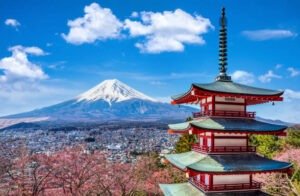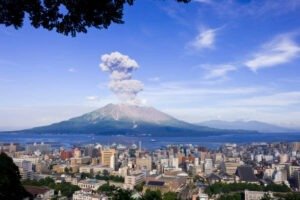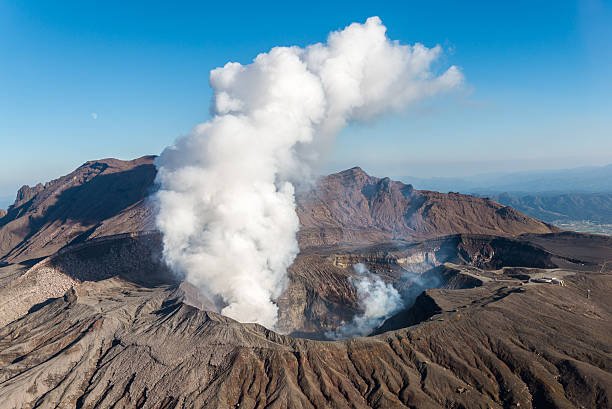Japan Volcano Eruption: Japan, known for its natural beauty and geographical wonders, is also one of the most seismically active regions in the world. Recently, a volcanic eruption in Japan has caught global attention due to its sudden intensity and potential risk to life and infrastructure. In this blog, we will explore the reasons behind the Japan volcano eruption, its immediate and long-term impacts, and why it is making headlines around the world.

Why the Japan Volcano Eruption is in the News:
The recent volcano eruption in Japan took place on [Insert Specific Date Here – e.g., July 3, 2025], at Mount [Insert Volcano Name – e.g., Mount Sakurajima or Mount Asama], one of Japan’s most active volcanic sites. The eruption spewed ash thousands of meters into the air, causing panic among residents, disrupting air travel, and prompting emergency evacuations in surrounding towns.
What makes this eruption newsworthy is:
-
Its sudden and explosive nature
-
Proximity to populated areas like Kagoshima or Tokyo (depending on the volcano)
-
Air traffic disruptions in and around Japan
-
Tsunami warnings triggered by seismic activity
-
Live images and videos are circulating on social media and international news channels
This has led to widespread media coverage and raised concerns about Japan’s readiness for such natural disasters, especially with the Tokyo Olympics behind us and other major global events on the horizon.
Geography and Volcanic Activity in Japan:
Japan is situated along the Pacific Ring of Fire, a zone notorious for high volcanic and seismic activity. The country is home to over 110 active volcanoes, accounting for about 10% of all active volcanoes in the world.
Some of the most famous volcanoes in Japan include:
-
Mount Fuji
-
Mount Sakurajima
-
Mount Aso
-
Mount Asama
These volcanoes are constantly monitored by the Japan Meteorological Agency (JMA). Despite Japan’s advanced warning systems, predicting the exact timing and scale of a volcanic eruption remains extremely difficult.
Details of the Recent Volcano Eruption in Japan:
According to the JMA, the volcano eruption in Japan released a high volume of ash, lava, and pyroclastic material. Tremors were felt in nearby areas, and there were concerns of potential lava flow reaching residential zones.
Key facts:
-
Volcanic Alert Level was raised to Level 5 (Evacuation Order)
-
Airlines cancelled or rerouted flights due to low visibility from volcanic ash
-
Over 5,000 people evacuated from nearby towns
-
No casualties were reported as of the latest update, but rescue teams are on alert
The government has activated emergency response teams, and shelters have been set up in safe zones. The eruption has also caused temporary closures of schools and public offices in affected areas.
Impact on People and the Environment:
The Japan volcano eruption has both immediate and long-term effects on the region:
1. Health and Safety
Volcanic ash can cause respiratory issues, especially among the elderly and children. Authorities have distributed masks and advised people to stay indoors.
2. Air Travel Disruption
Volcanic ash can damage aircraft engines. Flights from Tokyo, Osaka, and Nagasaki were delayed or diverted, affecting both domestic and international travelers.
3. Agricultural Loss
Ashfall has covered rice paddies and vegetable farms, possibly affecting the local food supply and economy.
4. Tourism
Tourist destinations near the volcano have been closed. Hotel bookings in nearby regions have been canceled due to safety concerns.
Japan’s Disaster Preparedness:
Japan is renowned for its advanced disaster-preparedness systems. From early warning alerts on mobile phones to earthquake-resistant buildings, the country has invested heavily in mitigating the risks of natural calamities.
For volcanic eruptions, JMA monitors geological activities around the clock. However, no technology in the world can fully predict the exact time of an eruption. This recent event highlights the unpredictable nature of volcanic activity and the constant need for public awareness and preparedness.

What Global Experts Are Saying:
Geologists and volcanologists around the world are closely watching the situation. Some experts believe this eruption could signal a series of future volcanic or seismic events, given Japan’s tectonic location.
There are also concerns about the climatic impact if the eruption continues for a long time. Volcanic ash in the atmosphere can affect global temperatures and weather patterns.
The Japanese volcano eruption is a stark reminder of nature’s unpredictable power. While the country is better prepared than most for such events, the risk remains real. The world watches with hope that Japan continues to handle the situation effectively, minimizes damage, and ensure the safety of its citizens.
As we continue to monitor the updates, it is essential for people living in or traveling to Japan to stay informed through official channels like the Japan Meteorological Agency and local news outlets.
ऐसे और भी एक्सप्लेनर लेखों के लिए हमारे साथ जुड़े रहें! Khabari bandhu पर पढ़ें देश-दुनिया की ताज़ा ख़बरें — बिज़नेस, एजुकेशन, मनोरंजन, धर्म, क्रिकेट, राशिफल और भी बहुत कुछ।
Kylie Page overdose क्यों हुई मौत ? जानिए Hollywood मॉडल की ज़िंदगी, संघर्ष और दर्द
American Independence Day: History, Significance, and Celebrations of the 4th of July


2 thoughts on “Massive Japan Volcano Eruption 2025: Cause, Impact, and Why It’s Making Headlines Worldwide”